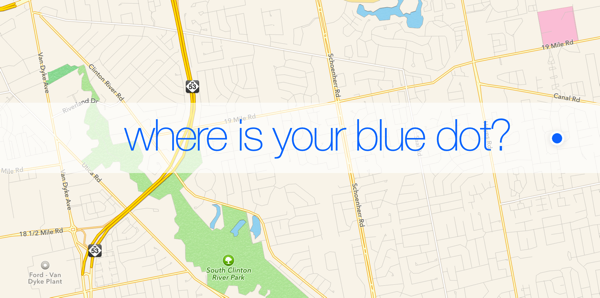 If you’ve ever used a smart phone for some sort of navigation, you’ve likely encountered the blue dot. You know, the indicator that shows up on top of the map you are looking at as a way to make it clear to you, “You are here.” The blue dot shows you at any given moment the exact coordinates of your location. It tells you the city you are in, the street you are traveling on, the neighborhood you are entering, and the driveway you are approaching. The blue dot makes it very clear that, “You are here."
If you’ve ever used a smart phone for some sort of navigation, you’ve likely encountered the blue dot. You know, the indicator that shows up on top of the map you are looking at as a way to make it clear to you, “You are here.” The blue dot shows you at any given moment the exact coordinates of your location. It tells you the city you are in, the street you are traveling on, the neighborhood you are entering, and the driveway you are approaching. The blue dot makes it very clear that, “You are here."
Where is your blue dot?
The most natural way that we will think of the blue dot is likely our location. But I’d like to expand our radius, if you will, to think about your blue dot beyond simply your location, and also your culture and your relationships. If you’re blue dot says, “You are here at this location.” I’d like to consider how it might also say, “You are here at this location, at this time in history, as you do life with these people.” God has placed you wherever you are. Your blue dot is the very place in which God has placed you. Certainly that dot is affected by a variety of factors - like the housing market, your career, your family members, etc. But God has placed you wherever you are and he has entrusted you with the Good News in the places he has placed you.
Location.
Where do you live? Where do you work? What community do you live in? God has placed you in these geographic locations and has entrusted you with the Gospel in these places. People all around you do not know the Gospel, many of them not even knowing a Christian who believes this very Gospel. Being a missionary doesn’t require you to go across borders or over seas, it just requires you to walk outside.
Culture.
The communities in which we live are not isolated from the world and period in history in which we live. What is the culture in which we live? What is the language of our culture? What is important in 21st century America? How do people see Christianity? Based on what many of us have likely seen and heard form culture, this can be terrifying. For many, it does not seem like a great time in history in culture. Regardless, it is important to understand the world in which we live. None of us would dare go into a foreign country ignorant of the language they speak, the way the dress, the social nuances of their culture, and the religious influences. The same is true in our own culture, we cannot ignore the world in which we live, even if it is far different than we would like it to be.
We live in a post-Christian, pluralistic culture. This means that we must understand that our culture is not shaped by the same values that many of us hold to as Christians. This means that our culture may be interested in spirituality, but have some difficulty with the idea of an objective truth. This is important because being a missionary today means taking this message of the Gospel and sharing it in the context of a post-Christian, pluralistic culture.
Relationships.
If you look at your own spiritual life, who has been most influential in your spiritual growth? Relationships are central to the way God has created us as humans and relationships are also central to to sharing of the Gospel. 1 out of 5 non-Christians don’t know a Christian. For some unbelievers, the first barrier to hearing the Gospel isn’t some kind of argument but it’s simply they don’t know anyone who believes it. God has placed us in all kinds of networks of relationships - in our workplaces, in our families, in our friendships, and in our neighborhoods. And God uses these relationships as we look for opportunities to share the Good News with those around us and to love our neighbors as we have been loved.
What are the challenges surrounding your blue dot?
